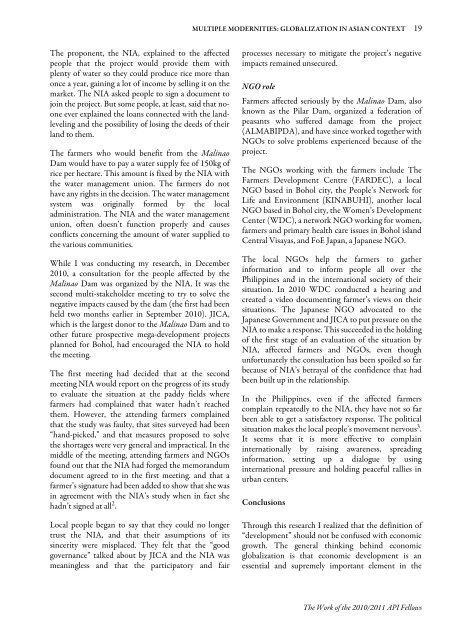Untitled - Api-fellowships.org
Untitled - Api-fellowships.org
Untitled - Api-fellowships.org
You also want an ePaper? Increase the reach of your titles
YUMPU automatically turns print PDFs into web optimized ePapers that Google loves.
MULTIPLE MODERNITIES: GLOBALIZATION IN ASIAN CONTEXT19The proponent, the NIA, explained to the affectedpeople that the project would provide them withplenty of water so they could produce rice more thanonce a year, gaining a lot of income by selling it on themarket. The NIA asked people to sign a document tojoin the project. But some people, at least, said that nooneever explained the loans connected with the landlevelingand the possibility of losing the deeds of theirland to them.The farmers who would benefit from the MalinaoDam would have to pay a water supply fee of 150kg ofrice per hectare. This amount is fixed by the NIA withthe water management union. The farmers do nothave any rights in the decision. The water managementsystem was originally formed by the localadministration. The NIA and the water managementunion, often doesn’t function properly and causesconflicts concerning the amount of water supplied tothe various communities.While I was conducting my research, in December2010, a consultation for the people affected by theMalinao Dam was <strong>org</strong>anized by the NIA. It was thesecond multi-stakeholder meeting to try to solve thenegative impacts caused by the dam (the first had beenheld two months earlier in September 2010). JICA,which is the largest donor to the Malinao Dam and toother future prospective mega-development projectsplanned for Bohol, had encouraged the NIA to holdthe meeting.The first meeting had decided that at the secondmeeting NIA would report on the progress of its studyto evaluate the situation at the paddy fields wherefarmers had complained that water hadn’t reachedthem. However, the attending farmers complainedthat the study was faulty, that sites surveyed had been“hand-picked,” and that measures proposed to solvethe shortages were very general and impractical. In themiddle of the meeting, attending farmers and NGOsfound out that the NIA had f<strong>org</strong>ed the memorandumdocument agreed to in the first meeting. and that afarmer’s signature had been added to show that she wasin agreement with the NIA’s study when in fact shehadn’t signed at all 2 .Local people began to say that they could no longertrust the NIA, and that their assumptions of itssincerity were misplaced. They felt that the “goodgovernance” talked about by JICA and the NIA wasmeaningless and that the participatory and fairprocesses necessary to mitigate the project’s negativeimpacts remained unsecured.NGO roleFarmers affected seriously by the Malinao Dam, alsoknown as the Pilar Dam, <strong>org</strong>anized a federation ofpeasants who suffered damage from the project(ALMABIPDA), and have since worked together withNGOs to solve problems experienced because of theproject.The NGOs working with the farmers include TheFarmers Development Centre (FARDEC), a localNGO based in Bohol city, the People’s Network forLife and Environment (KINABUHI), another localNGO based in Bohol city, the Women’s DevelopmentCenter (WDC), a network NGO working for women,farmers and primary health care issues in Bohol islandCentral Visayas, and FoE Japan, a Japanese NGO.The local NGOs help the farmers to gatherinformation and to inform people all over thePhilippines and in the international society of theirsituation. In 2010 WDC conducted a hearing andcreated a video documenting farmer’s views on theirsituations. The Japanese NGO advocated to theJapanese Government and JICA to put pressure on theNIA to make a response. This succeeded in the holdingof the first stage of an evaluation of the situation byNIA, affected farmers and NGOs, even thoughunfortunately the consultation has been spoiled so farbecause of NIA’s betrayal of the confidence that hadbeen built up in the relationship.In the Philippines, even if the affected farmerscomplain repeatedly to the NIA, they have not so farbeen able to get a satisfactory response. The politicalsituation makes the local people’s movement nervous 3 .It seems that it is more effective to complaininternationally by raising awareness, spreadinginformation, setting up a dialogue by usinginternational pressure and holding peaceful rallies inurban centers.ConclusionsThrough this research I realized that the definition of“development” should not be confused with economicgrowth. The general thinking behind economicglobalization is that economic development is anessential and supremely important element in theThe Work of the 2010/2011 API Fellows
















